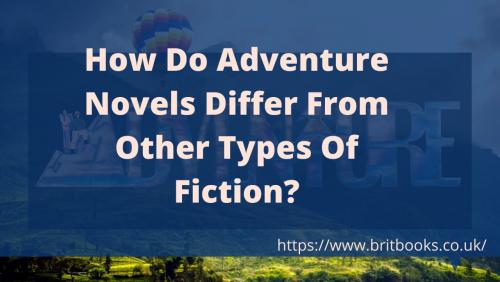How Do Adventure Novels Differ from Other Types of Fiction?

If you enjoy reading, you should be familiar with adventure fiction and its themes. Adventure novels have an action-packed plot in which a hero is shown fighting for the welfare of his community and society with his physical actions.
The protagonist, who is usually a hero, and his actions are generally the focus of these stories. A hero is traditionally a man with courage, power, selflessness, resolve, integrity, passion, confidence, caring, etc.
Romance, military adventures, spy thrillers, science fiction, and other genres are all connected with adventure novels!
Important Features of Adventure Novels
Excitement And Physical Acts –
Unlike other types of books, adventure fiction books contain a fast-paced plot with physical action and compelling storylines that can hold readers' interest. It combines several elements such as adventure, mystery, suspension, war, love, revenge, death, etc.
Over time, the tale builds to a spectacular climax or series of cataclysmic events, primarily involving the protagonist, the novel's hero. These novels' plots can occur globally, with intriguing surroundings, forests, palaces, etc.
Protagonist –
The tale's protagonist is the central figure throughout the entire storyline. A protagonist is traditionally a hero responsible for restoring peace and harmony to the lives of innocent people whom rival forces have ruthlessly victimised. Themes of such stories typically revolve around good and evil, with a hero emerging as the community's rescuer.
To write the best adult adventure novels, the writer should concentrate on the characteristics of a hero, which must contain courage, passion, might, selflessness, resolve, love, and strength in his actions.
Gloomy Moods –
Adventure stories have a gloomy and foreboding tone, with readers eagerly anticipating whether the hero will live to the end, if he can defeat the evilness of other forces and if he will triumph for the good of society.
Here, the author strives to create a sense of suspicion, mystery, and enjoyment among readers who constantly guess the plot's conclusion.
Evil Enemies–
In adventure novels, just as a protagonist is vital, so is an antagonist shown with bad tactics and behaviour. Because of his actions, readers strongly want to root for the hero and see him defeat the villain with his strength and bravery.
However, there is no hero and no victory without a villain. Therefore, both work as a person's right and left hands, necessary for writing a powerful and engaging adventure story.
Protagonist With a Sense of Humour
A dynamic protagonist is required in an adventure novel. This individual could be a man, woman, boy, girl, animal, or created figure, but they must have a strong personality characterised by high energy and willpower.
The main adventure character is not beset by profound emotional turmoil with other characters. However, these feelings may influence their desire to succeed.
Suspense
One of the most vital aspects of an adventure story is suspense. Readers return to this genre repeatedly because of a sense of danger, mystery, or the urge to survive. A skilled adventure author knows how to use hints and withhold information to draw out the plot successfully.
Exploration
The concept of exploration is another aspect of the adventure genre of fiction. When the protagonist is attempting to solve a mystery or save another character, it is common for them to go to new places. This gives the reader an exhilarating glimpse into exotic lands, transporting them to unknown realities.
A Quick Pace
Adventure novels have a quick pace that matches the other features. Adventure books would fast become too like the Drama category if they didn't have a different rate. Readers of adventure fiction should expect excitement as the protagonist takes them on a voyage through space and time.
Dilemma
A dilemma of some form, sometimes considered the "turning point" in the screenplay, provides the excitement of potential and change. This problem could be internal or external. It could be organic, artificial, ethical, or relational.
The protagonist will be obliged to respond to any form of situation. At this juncture, the main character must decide whether to act, and their response is frequently interpreted as heroic, clever, or skilled.
Article Source: https://www.britbooks.co.uk/blog/how-do-adventure-novels-differ-from-other-types-of-fiction.html
Post Your Ad Here
Comments